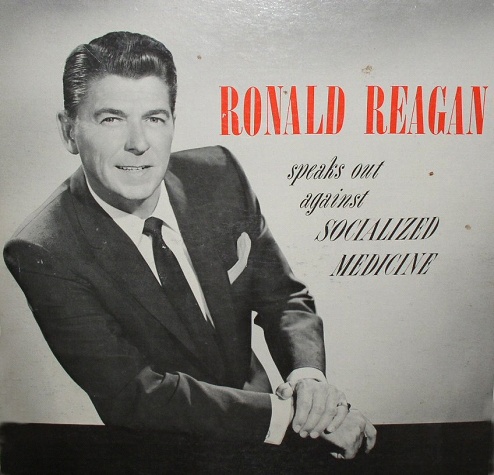Socialism: The Unending Republican Talking Point

The historian Lawrence Glickman on how Republicans have been banging the SOCIALISM!!!!! fearmongering talking point for generations.
At last week’s Republican National Convention, presidential son Eric Trump evoked Ronald Reagan when he warned about the imminent threats to freedom that a Biden administration would pose. Accusing the “radical Democrats” of wanting to burn the flag, defund the police and “erase history,” among other depredations, he depicted “the fight that we are in right now” as urgent and necessary for the preservation of liberty.
His remarks were similar to those of Sarah Palin, who referenced Reagan’s comments in her 2008 vice-presidential debate with Joe Biden and later included them in her 2010 book, “America By Heart,” as a sentiment that “perfectly expresses our need to protect and preserve American values.”
Although it’s not surprising to find Republicans quoting Reagan, there is a catch: This line from the Gipper came from a badly flawed 1961 prediction about Medicare. Reagan claimed — modifying a line that he had been regularly using in the previous months to dramatically conclude his speeches — that in the “sunset years” of his generation “our children and our children’s children” would not know “what it was like to be free” if Medicare, which Reagan denounced as “socialized medicine,” became the law of the land. Yet, today, more than 55 years after its enactment, Medicare ranks after Social Security as the second-most popular government program, and Americans remain free.
The continued use of an embarrassingly misguided warning shows how conservatives have gravitated toward recycled apocalyptic rhetoric, notwithstanding the fact that their dire predictions have never come to pass. Crying wolf like this long predates Reagan’s 1961 comment. It dates to the early days of Franklin D. Roosevelt’s New Deal, when Roosevelt’s opponents framed their criticisms not as a dispute about policy, but as an existential fight to preserve liberty.
When critics equated New Deal liberalism with socialism, they did so to mark the latter as the inevitable fate of the former. In the words of presidential son and future senator Robert Taft in 1936, the New Deal would “lead inexorably to complete socialism.” Predictions of imminent doom if the Social Security Act became law proved inaccurate, but that didn’t stop anti-New Deal Rep. Samuel Pettengill from predicting in 1936 (which Reagan echoed a generation later) that “this may well be the last generation of Americans to receive and cherish the legacy of liberty.”
These conservatives saw a slippery slope: liberalism plus time equals socialism. The New Deal was “a wolf in sheep’s clothing” — or what former president Herbert Hoover, whom Roosevelt replaced, called in 1949 “a disguise for the totalitarian state” — because, they believed, it was lulling the American people into accepting dangerous and metastasizing forms of government power. This gradualist “road to serfdom” (to borrow the title of F.A. Hayek’s 1944 best-selling critique of the welfare state, as federally supported social provisions began to be called in the late 1940s) was, “if anything, worse than all-out Communism,” according to one critic in 1955, because of the deception that lay at the heart of American liberalism. This is why, for these critics, it was always “five minutes to midnight,” to borrow one of their favorite images, employed by both Wendell Willkie, the Republican presidential candidate, in 1940 and Reagan in 1978 as he was getting ready to launch his successful 1980 presidential bid.
The extent to which this has really been effective can be debated, but certainly the ability to combine this was racism to demonize the ACA as OBAMACARE and DEATH PANELS certainly shows it will remain a key piece of the Republican fearmongering puzzle for a long time to come.
